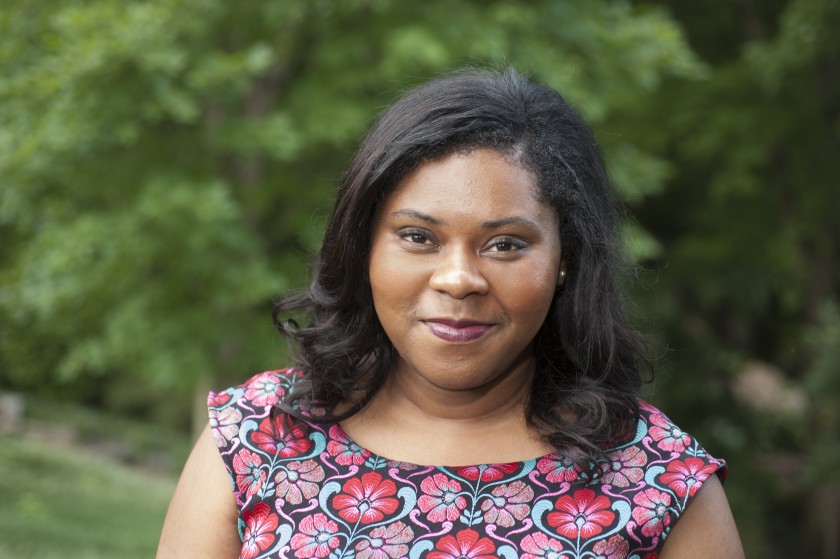Marissa Evans is a reporter for the Los Angeles Times covering race, inequity and health in Los Angeles and across California. She was previously the social issues reporter for the Star Tribune in Minneapolis and the health/human services reporter for the Texas Tribune. Her work has appeared in the Atlantic, Medium, Oprah Magazine and other outlets. She is also a trainer with the Ida B. Wells Society for Investigative Reporting.
What is your role at the LA Times and what led to that?

This is a new role in the aftermath of the LA Times’ own internal reckoning in the months after George Floyd’s death. While the newsroom has covered healthcare issues for a long time there was a push to more deeply cover the intersection of race and health in Los Angeles and in California, particularly given the pandemic. It was an unexpected move because my only goal this year was to survive the pandemic, not get a new job or move back to my home state. But this is a role I’ve been working toward all of my career: an enterprise reporting job focused on health stories and reporting on inequities in our health systems. My parents, my mentors and close friends have all noted this is a position truly made for me.
What drew you to investigative reporting?
I was drawn to the idea of doing immersive work exploring and explaining for communities how policies and systems work. I also loved the idea of having real time to research and interview to tell the best story possible. In my intern days I noticed right away the investigative reporters were this kind of elite ace squad who could sniff out the best stories and were given the luxury of time. I still crave that time to do this work and love the problem solving of how to get data, how to find interviewees and ambitious public records requests. But I’m also eager to help other journalists of color build the skills to find those big stories no matter what their coverage area might be. Too often journalists of color are told they’re “not ready” for investigative stories or never trained on Excel or how to do a public record request because they don’t get picked to go to conferences or are not paid enough to justify the expenses of paying out of pocket. I want to do my own best work but I’m determined to elevate journalists of color so they can level up their ideas and skills.
You’ve spoken a lot on the topic of trauma-informed reporting and the importance of training reporters on how to interview and cover vulnerable communities. Can you talk more about why this is so deeply needed in this industry?
The Floyd protests across the country and worldwide forced a lot of journalists to confront the fact they can harm the very communities they are tasked with serving. I’m frankly baffled by how often journalists march into communities and demand interviews and quick quotes without considering that person’s media literacy and experiences with the media. In recent weeks a journalist told me they did not get into journalism to be trauma informed and it’s troublesome to think how many journalists think this way. Our job as journalists should be to tell stories while minimizing and preventing harm as much as possible and that means taking steps to be mindful about what that looks like. Consider who we might interview over the course of our careers: a family who tragically lost a loved one, sexual assault survivors, victims of violent crime, suicide attempt survivors, school shooting survivors, people who survived natural disasters, veterans coming home from combat and the list goes on. We can’t in good faith say this kind of training should go to the wayside just because of newsrooms’ economic outlooks or people think it’s just something that is “learned on the job.” We can think about new models of revenue while also thinking about how to not traumatize our communities — this should not be an either or scenario. It’s not to say you don’t learn how to interview people who have experienced trauma on the job but we can do this work better if we took the steps to make best practices more widespread. We can’t build trust with the communities we serve or expect vulnerable populations to want to talk to us if we choose to be willfully ignorant about the harm media institutions of all sizes can cause.
What would it have been like to have this Society early in your career?
I’m grateful I got to attend my first Society training in January 2017 just months after starting my job in Texas where I knew I wanted to take my work to the next level. Until my time in Texas I had not been given the chance to do a longform story or investigative work yet and I was determined to change that. I think had the Society been around earlier in my career I would’ve had better strategies on how to advocate for time and space for my ideas. I also would’ve had a better sense of how to pitch my big ideas without the constant trial and error. There’s still not enough journalists of color with the investigative reporter title but having that early exposure would’ve shown me what’s possible.
Can you tell us what drives you to continue to do the work that you’re doing?
I’m driven to do this work because I still believe in the mission and vision of public service journalism that is eye opening and informative. I want to save lives and change laws with my work if I can or at the very least tell stories that help people fight a surprise medical bill or feel empowered to ask questions about the treatment they’ll be receiving. We’re all one accident or illness away from losing our livelihood and being subject to medical debt. A lot of my work focuses on what prevents people from accessing care, what makes the U.S. healthcare system intimidating and how that creates inequities for marginalized populations. You can’t adequately cover healthcare issues in America if you’re not reporting on medical racism, racial health disparities or generally talking to patients of color or medical professionals of color. While the goal of my role with the LA Times is to cover race and health it was frankly not a mandate I ever needed because I would’ve done so regardless.
What is your favorite piece of investigative journalism that you’ve worked on?
My favorite investigative story published in 2020 for the Star Tribune on how private non-profit hospitals in Minnesota can use the state’s Revenue Recapture program to take Minnesota residents’ income tax refunds for unpaid medical bills. I stumbled upon this story during my first three weeks with the newspaper after reading a Post and Courier story that mentioned Minnesota had a similar program to South Carolina. I immediately did a Google search and it was right there plain as day on the Department of Revenue website. I instantly knew I had a story. It’s a 22 year old Minnesota law that does not require private hospitals to get a court judgment or order before asking the state to give them patients’ tax refunds. Patients are often caught off guard when it happens and the administrative hearing process is woefully underused to fight against refunds from being taken.
Given the aftermath of Mr. Floyd’s death, the pandemic and the election cycle, I had to advocate for time to finish this story so the data wouldn’t get too old and to see it over the finish line. I loved this story not only because I found it on my own but also because I had to sort through five years worth of data looking at which organizations collected under the program and go through thousands of rows in Excel to find all of the hospitals and then cross reference their ownership structure to make sure they were private. It was tedious but also a testament to my data skills and my health expertise combining. Several months after the story published members of the Minnesota state legislature filed bills to stop these hospitals from being able to participate in the Revenue Recapture program. It’s now in the legislature’s tax omnibus bill and if it goes through this will be the first law I’ve ever changed with one of my stories. I’m proud of that.
What is an investigative journalism piece that you have read recently that really resonated with you?
I’ve loved reading Alain Stephens’s work covering ghost guns and efforts to force the Bureau of Alcohol, Tobacco, Firearms and Explosives to hand over public records.

